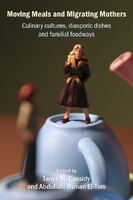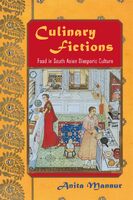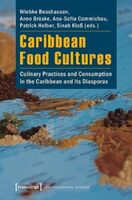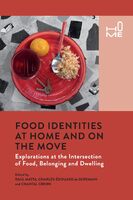Contents
- Culture & Cuisine in Diaspora: A Hidden Library Collection
- Food Customs and Cultural Identities in Diaspora
- Gender Roles in Culinary Diasporic Writings
Gender Roles in Culinary Diasporic Writings
In I Hate Borsch!, the narrator recounts that when she left Ukraine for America, every Kiev grandmother she knew gave her their secret borsch recipe as a farewell gift. One even told her, "Your husband will thank you!" Similarly, while many cookbooks and memoirs in this exhibit showcase men preserving or innovating culinary traditions, it appears more common for female members in the family to pass down recipes and memories from generation to generation.
Many of the academic works we feature investigate gender roles in global mobility and food practices. Moving Meals and Migrating Mothers: Culinary Cultures, Diasporic Dishes, and Familial Foodways is entirely devoted to the relationship between food and mothering in migration. Other monographs and academic anthologies also include studies of gender dynamics in diaspora. For instance:
The chapters “Feeding Desire: Food, Domesticity, and Challenges to Heteropatriarchy” and “Red Hot Chili Peppers: Visualizing Class Critique and Female Labor” in Anita Mannur’s Culinary Fictions: Food in South Asian Diasporic Culture.
Karolina Bielenin-Lenczowska, “Spaghetti with Ajvar: An Ethnography of Migration, Gender, Learning and Change” in Food Parcels in International Migration: Intimate Connections.
Elizabeth den Boer, “Hindu Ritual Food in Suriname. Women as Gatekeepers of Hindu Identity?” in Caribbean Food Cultures: Culinary Practices and Consumption in the Caribbean and its Diasporas.
Nora Kottmann, “Japanese Women on the Move: Working in and (not) Belonging to Düsseldorf’s Japanese (Food) Community” and Elsa Mescoli, “Between Food Practices and Belongings: Intersectional Stories of Moroccan Women in Italy” in Food Identities at Home and on the Move: Explorations at the Intersection of Food, Belonging and Dwelling.
Lastly, it is worth mentioning that studies on non-traditional gender identities in relation to culinary diaspora are gaining more recognition. In Eating Asian America: A Food Studies Reader, chapters such as "Love Is Not a Bowl of Quinces: Food, Desire, and the Queer Asian Body in Monique Truong's The Book of Salt" by Denise Cruz and "Perfection on a Plate: Readings in the South Asian Transnational Queer Kitchen" by Anita Mannur, serve as good examples.





